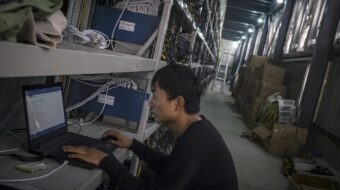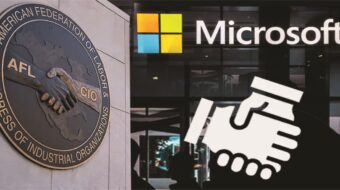
Vice President Joe Biden August 18, announced recovery act funded investments in 94 projects to provide high-speed Internet access to communities in 37 states. So far some $7 billion in recovery act funds have been allocated for investments in broadband development.
Currently, 36 percent of Americans do not have access to high-speed Internet, government officials estimate.
The funds will come in the form of grants and loans, some of which leverage additional private investments, to private and public utility companies to lay fiber optic cables, build wireless transmission towers and purchase other technologies to provide high-speed Internet service to some 19 million people, 1.8 million businesses, and thousands of other “anchor institutions,” like schools, local libraries, community centers, hospitals, and public safety facilities.
“Today’s investment in broadband technology will create jobs across the country and expand opportunities for millions of Americans and American companies,” Vice President Biden pointed out in a statement. “In addition to bringing 21st century infrastructure to underserved communities and rural areas, these investments will begin to harness the power of broadband to improve education, health care, and public safety.”
On a conference call with reporters, Aug. 18, administration officials emphasized the role of the recovery act and investments like these in creating jobs.
Vice President Biden’s top economic advisor, Jared Bernstein, told reporters that the recovery act has made a lot of progress, especially when compared to where the economy was when President Obama took office. “At that time, the depth of the recession was just becoming clear,” he said. “We now know that the economy was contracting at the nightmarish rate of almost seven percent in 2008.” And in the first six months of 2009 alone some 4 million jobs were lost.
The pace of the economic disaster was slowed and even turned around after President Obama signed the recovery act, Bernstein noted. “Over the past year, GDP has grown at the rate of three percent, and we’ve added over 600,000 private sector jobs,” he said. The recovery act also played a role in protecting or creating about 3 million jobs, according to Congressional Budget Office data and other non-government studies.
“We need to grow faster and to create more jobs,” he added, “but the huge swing here from negatives to positives is historically unprecedented.”
He explained the recovery act has moved into the “investment” phase with billions for developments in clean energy and technology, high-speed rail, and the new broadband Internet projects just announced.
Bernstein also chastised Republican governors and state lawmakers who opposed the recovery act for ideological reasons and initially refused to accept funds from it. Their obstructionism likely slowed the return of economic growth for their states and localities.
“It’s certainly the case if you were late to act on recovery act funds that were available to your community, you delayed job creation and that’s a very significant cost to the workforces in those communities,” he said.
Commerce Secretary Gary Locke said the new investments will build 25,000 miles of new broadband networks.
Responding to Republican charges that broadband access is a “luxury” in a time of high federal deficits, Locke stated that high-speed Internet is an important tool for business growth, education and job creation.
“When you talk to the small businesses I’ve come across throughout the country, for them, high-speed Internet service is a necessity,” he said. Without broadband access, “they’re losing orders. They’re not able to market themselves. They’re not able to transact with more customers or suppliers.”
“For them, high-speed Internet is just as important as electrification was for the country in the 30’s,” Locke explained. Access to high-speed Internet will open up the world to small businesses, students seeking online education, and local institutions like schools, libraries, healthcare facilities, and public safety organizations.
Photo: http://www.flickr.com/photos/usdagov/3839300499/sizes/o/












Comments